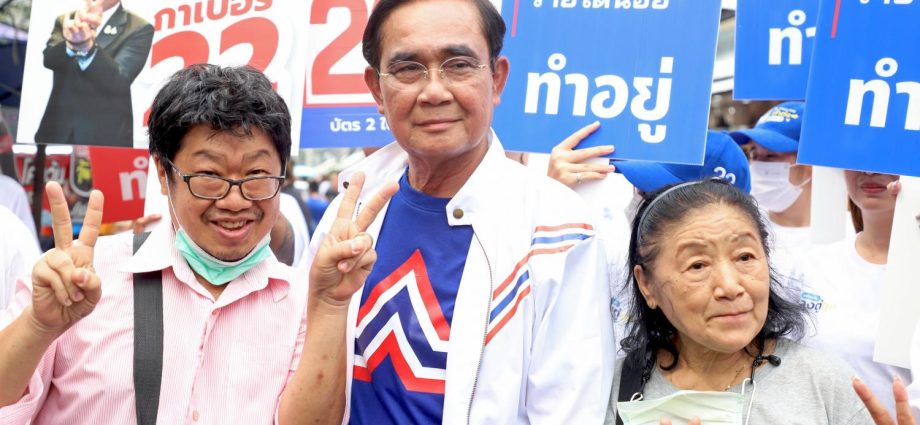
The countdown to a general election typically prompts some voters to strategise how they will vote on the big day.
With the May 14 polls around the corner, so-called tactical voting is being planned by some voters to prevent their least favourite parties garnering too many House seats.
A political analyst said strategic voting in the upcoming polls may occur at the expense of the Pheu Thai Party, which could jeopardise its goal of winning the election by a landslide.
Where Pheu Thai stands to lose from tactical voting could well be its closest ally, the Move Forward Party’s (MFP) gain.
According to the analyst, the biggest surprise may be where the tactical votes come from.
And thanks to the re-introduced dual-ballot system, such a voting practice is predicted to deliver a particularly potent result.
Recent opinion polls have been encouraging for the MFP, which has fared consistently better with each survey in the past several weeks.
At the same time, Pheu Thai’s rating has dipped, which spurred the party into examining where it has gone wrong in its campaign.
It was reasonable to assume the party had banked on its 10,000-baht digital wallet scheme to give its election standing more lift. Despite being ridiculed by critics as a populist handout, the 560-billion-baht programme, in which 10,000 baht will be spent within six months at shops within a 4-kilometre radius of where people live, was expected by the party to be the ace to trump economic stimulus election pledges by other parties.
However, a cautious review of the policy by some experts, who feared spending of such magnitude might harm fiscal discipline, has been a political headwind for the party. This might be the reason for the dip in Pheu Thai’s popularity.
As both Pheu Thai and the MFP belong to the self-styled “pro-democracy” camp, some supporters who traditionally back one party might switch to another one at the polls over a dubious campaign policy.
The expert said the switching of support within an alliance could explain the MFP’s improved performance in opinion polls.
The two parties have warmed to one another in their common political stance, although that may be as far as the amicability goes. Pheu Thai has made it abundantly clear on numerous occasions that it is doing everything in its power to sweep the election and rule the next government solo.
It is a message repeated many times over by Srettha Thavisin, former president and chief executive of the Sansiri real estate empire, who is now one of Pheu Thai’s prime ministerial candidates.
Pheu Thai was viewed as having snubbed the MFP’s hand of friendship when the latter earlier voiced its willingness to form a government with Pheu Thai.
In many constituencies, the two parties are, in fact, set on a collision course. Their candidates have rapidly become embroiled in an intense neck-and-neck race.
Meanwhile, according to the expert, some voters who oppose the two parties were mulling over whether they should adopt tactical voting in the polls.
These voters, who are zealous supporters of the likes of the Palang Pracharath Party, the United Thai Nation Party, and the Democrat Party, might be considering this option if they think their favourite candidate does not stand a chance of winning in constituencies where Pheu Thai and the MFP are top contenders.
The voters who dislike Pheu Thai more than they do the MFP and dread it clinching a landslide win could be tempted to cast their constituency ballots for MFP candidates while voting for their actual favourite parties in the party list system.
The expert said the “sacrificial” votes might be embraced under the dual-ballot election, where the votes of the defeated candidates will be thrown away.
If it had been the single-ballot method, as in the previous election, the votes cast for the losing candidates would be counted toward their respective parties’ nationwide tally and converted into party list seats, provided there were enough votes.
Instead of wasting their votes, some voters might opt to strategise and resort to keeping their biggest foes from becoming too big in the next election, the expert said.
First might not be enough
Many opinion polls suggest Pheu Thai is on course for a big win at the general election. Unfortunately though, the party’s chances of forming a coalition government are being thrown into doubt.

Prayut: Faces pressure if re-elected as PM
By tradition, a political party that captures the most seats is recognised as receiving a mandate to put together a coalition. In the 2019 polls, Pheu Thai, which grabbed the largest share of House seats, proceeded to try and set up a government but failed to achieve the majority it needed.
This time around, analysts are increasingly doubtful parties will observe this long-standing practice which is not constitutionally required. They reckon rivals will jostle hard to try and gain the upper hand in putting together a coalition government, regardless of how many seats they won.
Of all the parties, the United Thai Nation Party (UTN) is believed to have a solid chance of forming a government, although it is projected to finish third or even fourth with about 40 seats.
Some speculate that the jockeying will start as soon as the UTN, which nominated its chief strategist, Gen Prayut Chan-o-cha as its No.1 prime ministerial candidate, appears to win at least 25 seats, the minimum number required for a party to be able to nominate a prime minister.
According to

